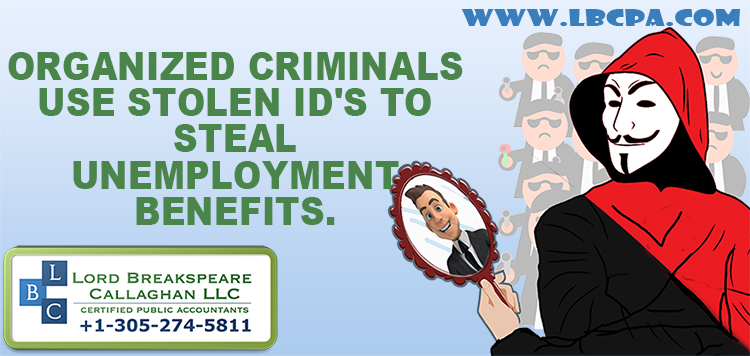LBCPA News 
Click here to go back
Identity Theft and Unemployment Benefits

States have experienced a surge in fraudulent unemployment claims filed by organized crime rings using stolen identities. Criminals are using these stolen identities to fraudulently collect benefits across multiple states.
Because unemployment benefits are taxable income, states issue Form 1099-G, Certain Government Payments, to recipients and to the IRS to report the amount of taxable compensation received and any withholding. Box 1 on the form shows "Unemployment Compensation." You should report fraud to the issuing state agency and request a corrected Form 1099-G.
For details on how to report fraud to state workforce agencies, how to obtain a corrected Form 1099-G, a list of state contacts and other steps you should take if you are a victim, see the U.S. Department of Labor’s DOL.gov/fraud page. Please follow Department of Labor guidance on reporting fraud and protecting yourself from additional scams.
You may be a victim of unemployment identity theft if you received:
- Mail from a government agency about an unemployment claim or payment and you did not recently file for unemployment benefits. This includes unexpected payments or debit cards and could be from any state.
- An IRS Form 1099-G reflecting unemployment benefits you weren't expecting. Box 1 on this form may show unemployment benefits you did not receive or an amount that exceeds your records for the unemployment benefits you did receive. The form itself may be from a state in which you did not file for benefits.
- While you are still employed, a notice from your employer indicating that your employer received a request for information about an unemployment claim in your name.
IRS Information for Taxpayers
When you file your income taxes, ONLY include income you received, even if you have not yet received a corrected 1099-G from the state.
- The processing of your tax return should not be delayed while your report of unemployment identity theft is under investigation.
- Do not report the incorrect 1099-G income on your tax return.
- The American Rescue Plan of 2021 provides for a one-time exemption of $10,200 per person in unemployment benefits to individuals and couples who earned $150,000 or less last year. If you have already filed your taxes, do not file an amended return. The IRS will issue additional guidance.
- There is no requirement to file a Form 14039, Identity Theft Affidavit. A Form 14039 should be filed only if the taxpayers' e-filed tax return is rejected because a duplicate return with their Social Security number is already on file or if the IRS instructs them to file a Form 14039.
- Taxpayers who were victims of an unemployment benefits identity theft scheme should consider opting into the IRS Identity Protection PIN program. An IP PIN is a six-digit number that helps prevent thieves from filing federal tax returns in the names of identity theft victims. The IP PIN is a voluntary program open to any taxpayer who can verify his or her identity. See details at Get an IP PIN.
IRS Information for Employers
Employers are often the first line of defense against unemployment fraud. Employers should:
- Respond quickly to state notices that its employees have filed for unemployment claims, especially if the names on the notices are not employees;
- Be alert to misuse of the IRS-issued Employer Identification Number that fraudsters may use to file jobless claims;
- File a Form 14039-B PDF, Business Identity Theft Affidavit, if the company’s EIN is being used to generate fraudulent unemployment benefit claims.
- Write to the IRS to close out the business tax account if the company is going out of business; this will help curtail the misuse of dormant EINs.
Justice Department Warns on Fake Unemployment Benefit Websites
The Department of Justice recently warned that fraudsters are creating websites mimicking unemployment benefit websites, including state workforce agency (SWA) websites, for the purpose of unlawfully capturing consumers’ personal information.
To lure consumers to these fake websites, fraudsters send spam text messages and emails purporting to be from an SWA and containing a link. The fake websites are designed to trick consumers into thinking they are applying for unemployment benefits and disclosing personally identifiable information and other sensitive data. That information can then be used by fraudsters to commit identity theft.
Help stop these scams by reporting them and using the list of state contacts at DOL.gov/fraud.
If you have any questions regarding accounting, domestic taxation, essential business accounting, international taxation, IRS representation, U.S. tax implications of Real Estate transactions or financial statements, please give us a call at 305-274-5811.
Source : IRS






